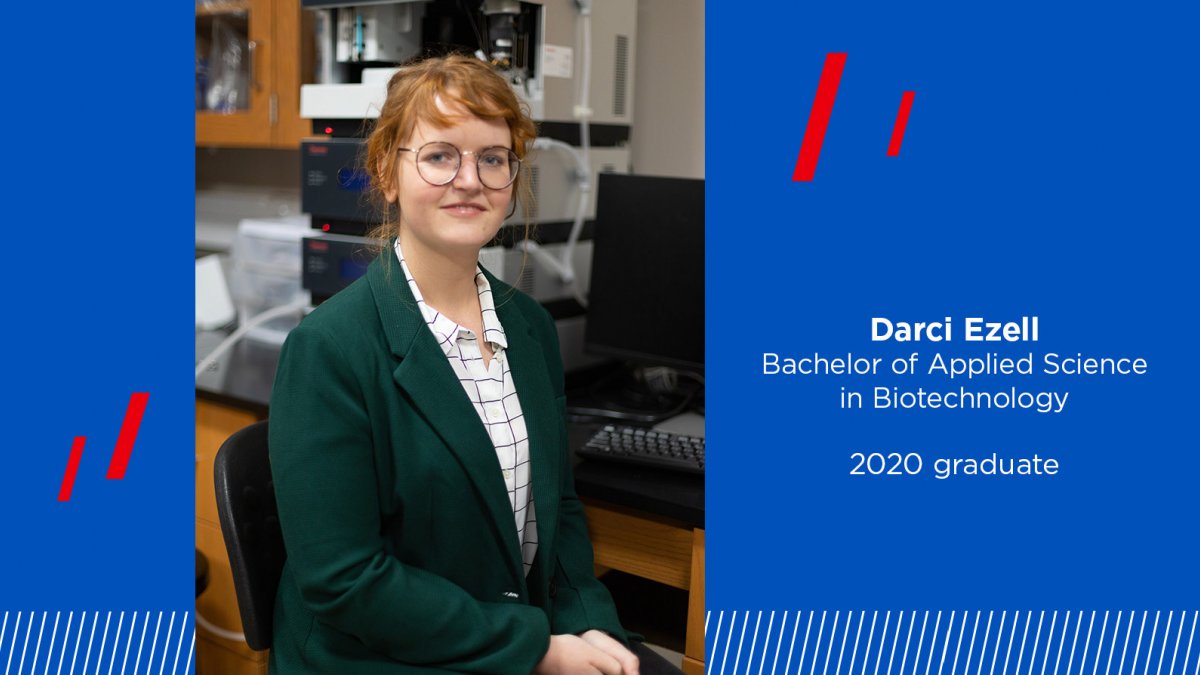Biotechnology graduate shows the power of learning by doing

Aristotle once wrote, “For the things we have to learn before we can do them, we learn by doing them.” In other words, we learn new skills best through trying them out, learning what didn’t work, and practicing with the help of others with more experience.
That approach also describes fall 2020 Bachelor of Applied Science in Biotechnology graduate Darci Ezell’s experience at KUEC. “I find it is much easier to learn and pay attention when you are the one doing it and not just watching,” Ezell said. “I enjoy the process of designing an experiment and trying to foresee any problems I might have, almost more than executing it. Once I run into an unforeseen problem, I also really enjoy figuring out what went wrong and why.”
Ezell’s journey through the biotechnology program offered plenty of opportunities to learn from and share her knowledge with others. During her studies, Ezell worked with graduate students at KU’s Lawrence campus, where she shared research techniques, and gained new expertise as well.
“The grad students on the main campus were very easy to share information with as they had a lot of previous lab experience and knew the chemistry and biology to understand the different aspects of the technique I was sharing with them,” Ezell said. She said the experience helped her better understand some elements of laboratory process as well. “Being Ph.D. candidates in pharmaceutical chemistry they had a much greater knowledge of how the chemistry worked, and I learned a lot from them.”
Additionally, Ezell worked in KU’s graduate-level Pharmaceutical Chemistry labs last spring, under Teruna Siahaan, Ph.D. Ezell helped with research on drugs that can open up the blood-brain barrier, a structure surrounding most blood vessels in the brain which protects them from toxins, pathogens or potentially dangerous neurotransmitters. Only molecules of very small size and specific polarity can get through.
Ezell says the nature of the blood-brain barrier makes it difficult to effectively treat brain-related diseases. “Finding a way to non-invasively deliver drugs to the brain could open up possibilities for treating all kinds of diseases like Alzheimer's and multiple sclerosis.”
Siahaan said Ezell’s work in his lab has prepared her well for a career in the field. “Darci has great training to carry out cell culture studies and evaluating proteins on cells,” Siahaan said. “Hands-on experience is important for students because they can apply what they have learned in class to real research situations. They can also contribute directly to the advancement of research in biomedical sciences.”
In this respect, Ezell, who currently plans to enter the biotechnology field before returning to school for graduate studies, says KU’s program was a great fit for her learning style and interests.
“Most other programs teach only you the purpose of these scientific techniques and maybe a little about how they work. In KU’s biotechnology program, you learn all of the nuances of how the techniques work and you get to perform them independently to solve problems. You get to make all mistakes and see the results,” Ezell said. “Enrolling in the biotechnology program at the KU Edwards Campus was probably the best decision I've ever made.”





